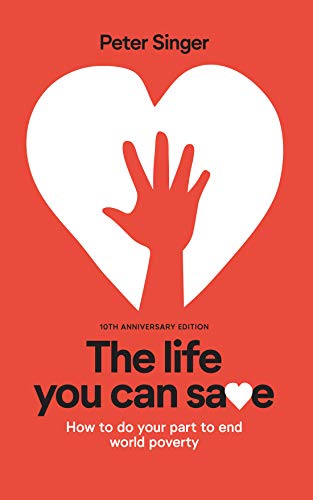What do you think?
Rate this book


Singer contends that we need to change our views of what is involved in living an ethical life. To help us play our part in bringing about that change, he offers a seven-point plan that mixes personal philanthropy (figuring how much to give and how best to give it), local activism (spreading the word in your community), and political awareness (contacting your representatives to ensure that your nation's foreign aid is really directed to the world's poorest people).
In The Life You Can Save, Singer makes the irrefutable argument that giving will make a huge difference in the lives of others without diminishing the quality of our own. This book is an urgent call to action and a hopeful primer on the power of compassion, when mixed with rigorous investigation and careful reasoning, to lift others out of despair.
304 pages, ebook
First published January 1, 2009
The World Bank defines extreme poverty as not having enough income to meet the most basic human needs for adequate food, water, shelter, clothing, sanitation, health care, and education. Many people are familiar with the statistic that 1 billion people are living on less than one dollar per day. That was the World Bank’s poverty line until 2008, when better data on international price comparisons enabled it to make a more accurate calculation of the amount people need to meet their basic needs. On the basis of this calculation, the World Bank set the poverty line at $1.25 per day. The number of people whose income puts them under this line is … 1.4 billion.
The real dilemma for most of us, is whether it is wrong and unnatural to reject our children’s pleas for the latest expensive computer games, to spurn designer-labeled kids’ clothing, and to send them to the local (entirely adequate but not outstanding) public schools. The savings you gain by taking the less-expensive option in each case will allow you will allow you to donate sums toward saving the lives of strangers. But do your obligations to your own children override your obligations to strangers, no matter how great their need or suffering?
Sometimes in Haiti, Farmer will hike for hours to see patients far from any roads. He insists on doing this because to say that it takes too much time and effort to visit these patients is, in his view, to say that their lives matter less than the lives of others. Flying from the peasant huts and their malnourished babies in Haiti to Miami, just 700 miles away, with its well-dressed people talking about their efforts to lose weight, Farmer gets angry over the contrast between developing countries and the developed world. What troubles him most is what troubled him all those years ago about the American doctor who was about the leave Haiti: “How people can not care, erase, not remember.”
…the conflict that Farmer and Kravinsky feel so acutely, between being an ideal parent and acting on the idea that all human life is of equal value, is real and irresolvable. The two will always be in tension. No principle of obligation is going to be widely accepted unless it recognizes that parents will and should love their own children more than the children of strangers, and, for that reason, will meet the basic needs of their children before they meet the needs of strangers. But this doesn’t mean that parents are justified in providing luxuries for their children ahead of basic needs of others.